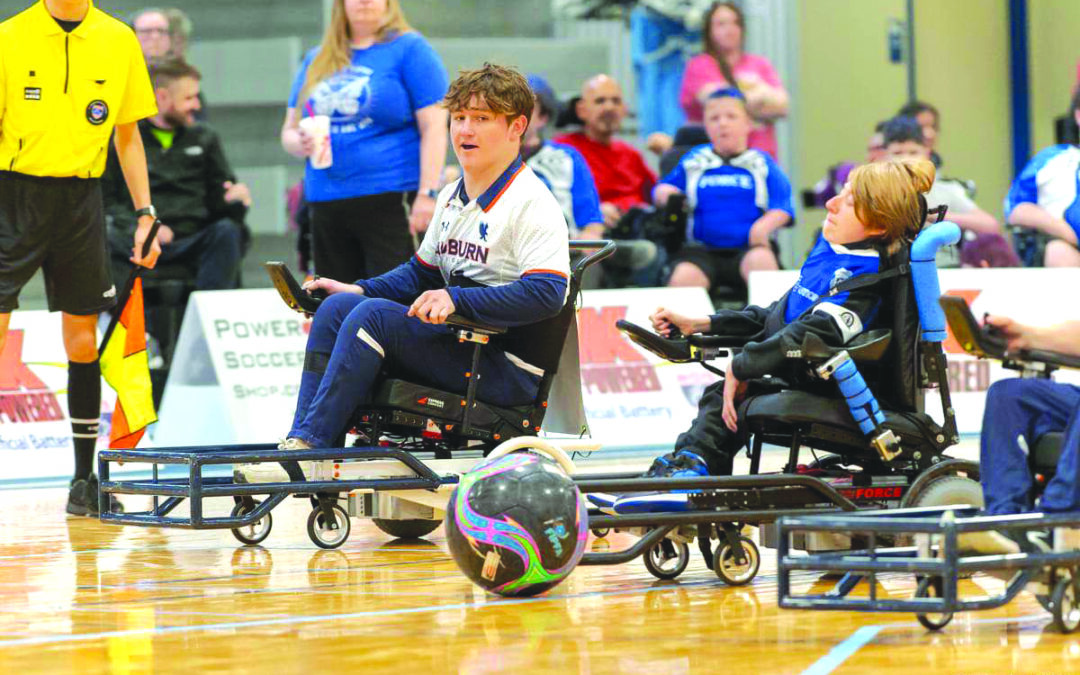BY NOAH GRIFFITH
FOR THE OBSERVER
AUBURN –– Auburn University graduate student Zach Dickey has seen the adaptive sports landscape expand in his five-plus years on the Plains — more than once.
The Indiana native has seen the program’s wheelchair basketball and wheelchair tennis teams grow and thrive, and the newest adaptive sport just completed a successful first season. Auburn power wheelchair soccer finished its debut season at 14-1 with a fifth-place finish at the national tournament.
“I was part of the first recruiting class for Auburn wheelchair basketball, and I don’t think they had plans to bring wheelchair tennis back at that point, but then tennis comes back and starts doing well and then for us to add power soccer — it really shows how much support [adaptive sports] have at Auburn,” Dickey said.
With a lot of adaptive athletes crossing over among sports at Auburn, they have built a community that has gradually increased with each sport they add. Many of the wheelchair basketball players also played power soccer this year, but even the ones who didn’t still supported the new team.
“It’s been really cool to see, like, you see it in the able-bodied sports at Auburn – how the basketball guys go to women’s basketball games, and the football team is at the basketball games and all. All those teams support each other,” Dickey said. “Now, it’s the same with us. In our biggest game this year, which was the one game we lost, we had a bunch of wheelchair basketball guys banging on drums and stuff and cheering us on.”
The first season of power wheelchair soccer at Auburn helped put the sport on the map.
Auburn was the first college to form a power soccer team, and their early success caught the attention of high school adaptive athletes. Not only did several high schoolers visit Auburn University specifically as prospective power soccer players, but they landed their first commitment this year.
As the sport garners more interest, Dickey is cherishing the opportunity to allow more adaptive athletes to become college athletes – something that is rare but becoming more common by the year.
“If you ask like 90% of kids growing up in America, they’d be like, ‘Yo, I want to go play a sport in college,’” Dickey said. “For these (adaptive athletes), that’s never been an opportunity, and it has nothing to do with how good they are in their sport. It had everything to do with the fact that they were too disabled to play an able-bodied sport. So it’s awesome for the future of our program that there’s interest, but these kids are also fired up to have a chance to be a real D1 college athlete.”
Dickey was disappointed in the turnout at the national tournament after such unprecedented success in the regular season, but in the grand scheme of things, he is excited to see the growth of the sport and the development of adaptive sports at colleges that resulted from year one.
According to Dickey, other schools are now showing interest in cultivating power soccer teams, and Auburn plans to open next season with a tournament against other college programs including the University of Michigan, the University of New Hampshire and Washington University in St. Louis. Dickey is hoping those schools are just the start of the adaptive sports expansion.
“With sports like power soccer coming into existence, college students have been inspired to push for [adaptive sports] on their college campuses,” Dickey said excitedly. “That’s a plus – like that’s huge. Everything off the court this season gets an A+. On the court, I’d never admit that we’ve had an A+ season because I’m so competitive, but I’d say C – maybe C+. Exciting stuff happening for the future of this program.”
Power soccer has four divisions consisting of 10 teams a piece, with the top three in each getting promoted up a level and the bottom three moving down a level proceeding every season. Finishing in fifth, Auburn is maintaining its competition level going into year two, but the goal going forward is to earn a promotion.
With his graduation set for the end of this summer, Dickey won’t be on the court to help the Tigers get the promotion. He plans to have a hand in it nonetheless.
Dickey has played power soccer since he was 10 and became the fourth member of his family to play for the U.S Powerchair Soccer National Team in 2023, and he doesn’t plan to be done with the sport or Auburn University anytime soon. He hopes to get a job at the university and plans to continue coaching wheelchair basketball under head coach Robb Taylor and transition to a coach in power soccer as well.
He plans to hold those roles and watch adaptive sports continue to evolve at the college level for years to come.
“Man, I just want to be a part of this for as long as I can,” Dickey stated surely. “Because I can see that it’s growing, and with Robb Taylor and Nathan Waters leading the basketball and tennis programs here, I’m just not ready to give it up. I’ll be comfortable leaving once we fill [Beard-Eaves Coliseum] one time. When we get those blue seats filled up and it’s as loud as it was back when Charles Barkley was there, that’s when I’ll feel comfortable leaving.”


